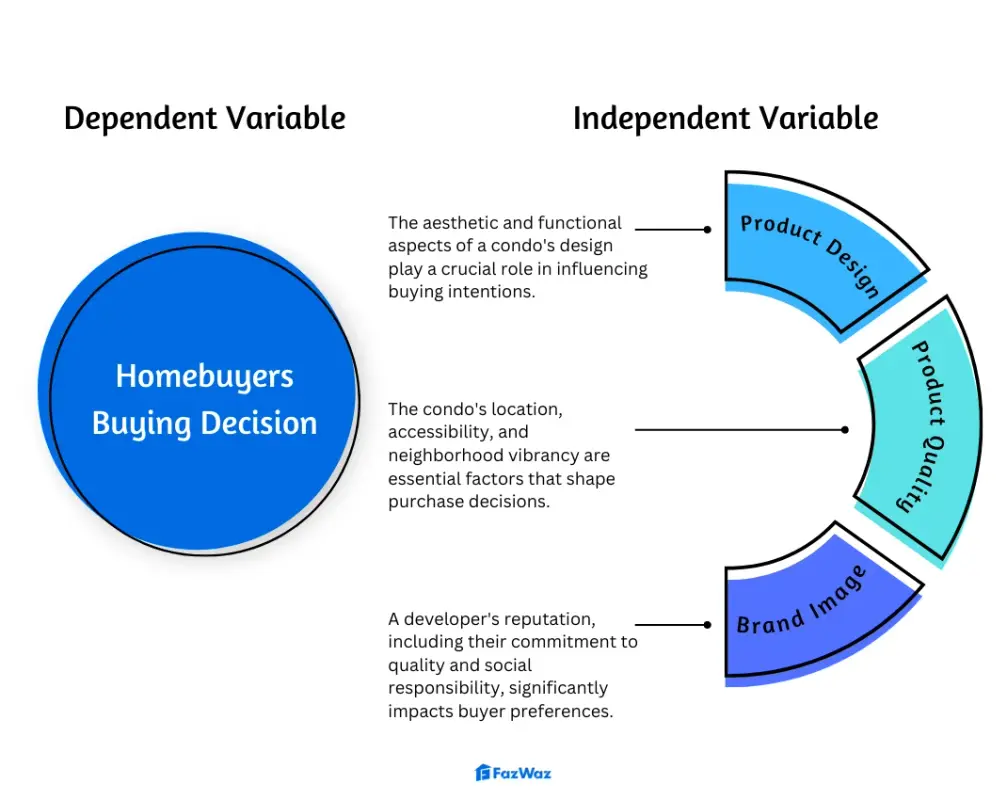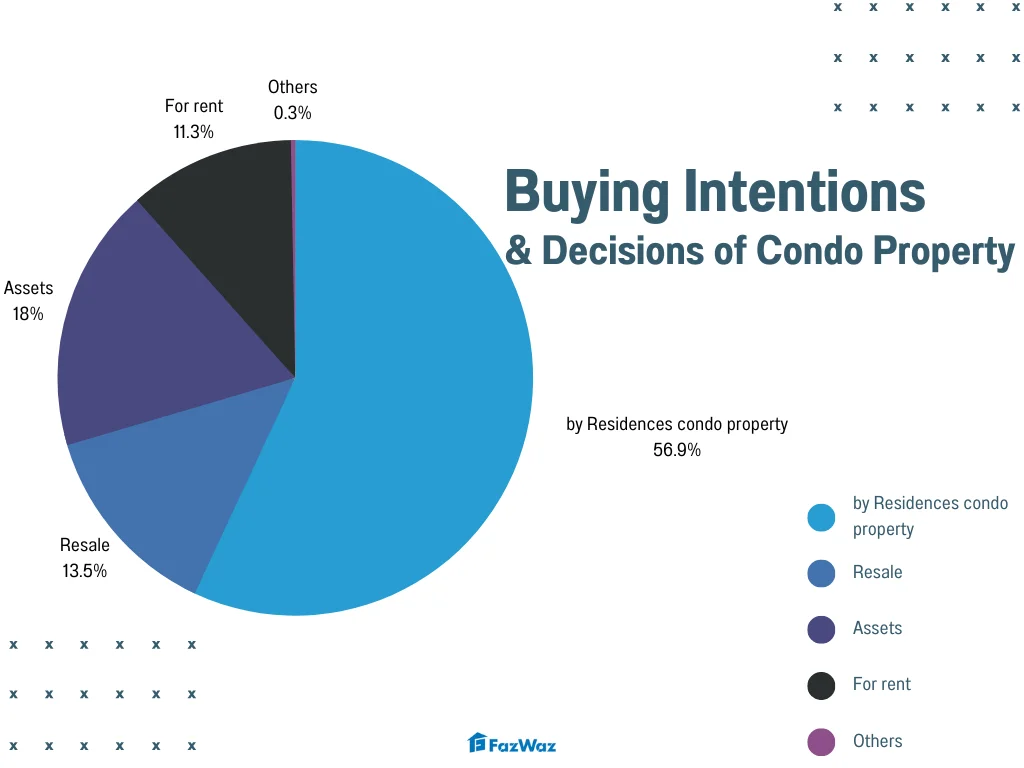- List your property - it's free
- Sign up or Log in
-
English- en
-
THB - ฿
- Buy
- Thailand Property For Sale
- Thailand Real Estate
- See Newest Listings
- Why Buy with FazWaz
- Rent
- Sell
- Projects
- Advice
- Property Management
- Vacation Rental Management

In Thailand's condominium market, product design and product quality are key factors influencing buyer decisions. As underlined by a study involving 400 participants. Thai homebuyers demonstrate a strong inclination towards product quality and brand image, as opposed to product design, when selecting a condominium.
Product quality, signifying the performance, durability, and reliability of a condo. Coupled with property developer brand image and reputation emerge as important factors guiding homebuyers buying intentions.
While product design, encompassing architectural style, interior layout, and overall aesthetics, plays a part. Product design pales in comparison to the aforementioned variables. As such, these findings shed light on key drivers of buyer behavior in Thailand's condo market. Underscoring the need for property developers to emphasize quality and fortify their brand image to cater to customer preferences effectively.
We delve into the rationale behind the rising preference for condominiums in the Thai real estate market.
Firstly, the fundamental human need for shelter plays a significant role, with purchasing a home being one of the primary objectives in an individual's life. In recent times, condominiums have emerged as an attractive housing option, providing a blend of comfort, convenience, and luxury meeting buyers' demand for quality residences.
Secondly, maintenance and upkeep, which can often be a difficult task for standalone homes, are considerably reduced in the case of condos. The younger generation, in particular, has shown a preference for condominium living due to the minimal maintenance responsibilities. Condos often have a dedicated management team that takes care of general repairs, landscaping, and amenity upkeep, allowing residents to enjoy a hassle-free lifestyle.
Lastly, location and accessibility also play a pivotal role in influencing purchase decisions. Many condos in Thailand are strategically located near BTS stations, ensuring easy and fast transportation. This proximity to public transportation not only enhances the convenience factor but also substantially improves the quality of life. Making condominiums a choice for urban living.
A buyer's perception of product quality is often influenced by their expectations contrasting their experiences. If a condo unit meets or exceeds the buyers' preconceived expectations, they are likely to perceive it as a high-quality product. Conversely, if the condo unit fails to deliver on those expectations, its quality is deemed lower. Hence, the equation of expectation versus experience becomes a cornerstone in defining product quality from a buyer's perspective.
Furthermore, buyers assess product quality through 5 key factors:
1. Tangible Amenities: This refers to the physical features and facilities provided within the condo complex, including fitness centers, swimming pools, playgrounds, security systems, and parking facilities, among others. The quality, maintenance, and utility of these amenities significantly contribute to the perceived product quality.
2. Reliability: Reliability pertains to the consistency of the living experience that the condo unit offers. This includes the quality of construction, durability of the materials used, safety standards, and the ability of the condo to provide a hassle-free living experience over time.
3. Attentiveness: This refers to the level of attention and commitment the condo management shows towards addressing the needs and concerns of the residents. A proactive management team that promptly attends to issues can enhance the perception of product quality.
4. Assurances: Assurances are tied to the trust and confidence buyers have in the condo developer and the management team. These assurances could be legal safeguards, warranties, or the developer's reputation for quality and reliability.
5. Responsiveness: Lastly, the quality of services within the condo, such as maintenance services, security, cleaning, and other additional services, play a crucial role. Efficient, timely, and courteous services enhance the overall living experience, thereby elevating the perceived product quality.
We analyze the vital role of product design in shaping the appeal and functionality of condominiums. This analysis is conducted through two primary dimensions: "Benefits of Product Design" and "Experience Benefits."
1. Benefits of Product Design: In this facet, we examine the practical and technical advantages that a thoughtfully executed product design offers to a condo unit. The technical benefits of product design manifest in various ways. For instance, product design offers benefits like efficient architectural layout for easy movement, intelligent space utilization, and functionality for convenient living. An exemplary illustration would be a condo unit designed with an open floor plan, allowing flexibility in the use of space and fostering a sense of spaciousness. Similarly, the placement of fixtures and fittings in intuitive locations that enhance ease of use, contribute to the overall appeal and functionality of the condo unit.
2. Experience Benefits: Moving beyond functionality, the product design of a condo can impact residents' experiences. The benefits from product design become apparent when residents interact with the condo's amenities and absorb the atmosphere that the design creates. For example, a meticulously designed rooftop garden can not only offer a lush, visual appeal but also induce feelings of calm, significantly enhancing residents' experience. Additionally, the sensory aspects of design, such as the color palettes used in communal areas to promote a sense of calmness, or the incorporation of natural elements that add a refreshing fragrance to common spaces. All add to the experience benefits that the product design provides.

Analysis of Buying Intentions and Decisions in the Condo Property Market
We decipher the primary motivations behind purchasing decisions using a pie chart that outlines four key reasons: property residency, resale potential, asset acquisition, and rental opportunities, along with other unspecified reasons.

The data summary points towards a notable correlation between these reasons and three major factors: product design, product quality, and brand image.
1. Product Design: Our data demonstrate that product design emerges as a significant determinant of buying intentions. The unique benefits and features of the condo, as well as its aesthetic appeal, have a substantial influence on purchasing decisions. The architectural beauty of the building and the attractiveness of the surrounding landscape, for instance, can be pivotal in enticing buyers. Furthermore, the functionality of the condo design must cater to consumer needs effectively. For example, an efficient floor plan that optimizes space or a smart home system that simplifies daily tasks can significantly increase the condo's appeal.
2. Product Quality: The quality of a condominium is another critical factor shaping buyer intentions. Aspects like location, accessibility via public or private transportation, and the vibrancy of the neighborhood significantly impact purchase decisions. For instance, a condo located in a bustling neighborhood with convenient access to public transit, shopping complexes, and recreational facilities will likely have a higher appeal to potential buyers.
3. Brand Image: The image of the condo developer is the third key influence on purchasing decisions. A strong marketing strategy and positive brand image can foster buyer confidence. For instance, a developer known for their high-quality construction, timely delivery, and excellent after-sales service will be favored by buyers. Additionally, brands that demonstrate social responsibility and goodwill often have an edge. A developer's participation in social responsibilities like charity work, supporting local education initiatives, or community clean-up efforts can bolster their reputation as a socially conscious enterprise. This commitment to the greater good often resonates positively with homebuyers, influencing their intentions and preferences.
In the context of Thailand's condo market, particularly in the key urban areas of Bangkok, Chiang Mai, and Pattaya, buyer intention plays a pivotal role in shaping real estate trends. This term refers to a potential buyer's inclination to purchase a specific condo, heavily influenced by variables such as product design, product quality, and brand image. Each city, with its unique allure and lifestyle offerings, attracts different buyer segments. For instance, the cosmopolitan dynamism of Bangkok, the serene cultural richness of Chiang Mai, and the vibrant resort-style living in Pattaya, all shape the buying intentions in their respective markets. Understanding these unique motivations and aligning them with the mentioned key factors can enable developers to design and market condos that resonate with potential buyers' needs and aspirations, effectively stimulating purchase decisions.
1. Regional Analysis: When we break down these figures by region, a similar trend emerges. In Bangkok, for every 19 new developer units, there are 82 resale units, a ratio that translates to approximately 23% and 77% respectively. In Chiang Mai, the disparity is more significant, with only one new developer unit for every eight resale units, equating to roughly 11% and 89%. Pattaya follows a similar pattern, with the ratio of new developer units to resale units being approximately 19% to 81%.
2. Resale Vs Developer Units: The preference for resale condos over developer units could be due to a multitude of factors. Resale condos, particularly those that have been well-maintained or refurbished, could potentially offer superior product quality or design. Furthermore, brand image can also play a role, especially if the resale condos are associated with reputable developers.
3. Buyer's Intention Factors: The reasons behind these purchasing decisions can be diverse and may include personal use, investment purposes, holiday homes, or a combination of these factors. Understanding these motivations can help developers and realtors alike to better cater to buyer needs and expectations, thereby influencing buyer decisions in their favor.
We further refine our analysis by considering the strategies employed in encouraging homebuyers to gravitate toward certain projects. Utilizing our internal data, we make comparisons between developer units and resale units, focusing on their unique features and how they influence buyers' decisions.
1. Strategy Application: Leveraging our earlier identified strategy, we discern a certain pattern in homebuyers leaning towards similar projects as suggested by our hypothesis. This pattern underscores the impact of factors such as product design, product quality, and brand image on buyer decisions.
2. Developer Units Vs Resale Units Analysis: To illustrate this, let's compare two popular condo projects: 'Quintara MHy’ZEN Phrom Phong' - a developer unit, and 'The Base Sukhumvit 77' - a resale unit.
We analyze buyer behavior within Pattaya's condominium market utilizing internal data. This data focuses on two particular condominium projects: Diamond Suites Resort Condominium and Whale Marina Condo.
To summarize, our examination of the Thailand condo market reveals several key insights. Firstly, the role of product design is found to be crucial in buyer decision-making, with its significance varying according to the intended use of the property. Aesthetics and functionality may be prioritized for personal use or holiday homes, while practical elements that promise better resale value or rental appeal may be sought by investors. Secondly, the brand image of the developer is seen to significantly influence those looking at investment properties, with reputable developers being synonymous with reliability, quality, and enhanced resale values. Lastly, understanding buyer intentions - whether for personal use, as an asset, for resale, or as a rental property - is crucial for developers, marketers, and realtors to align their offerings and strategies effectively. This understanding allows them to better navigate the complexities of buyer behavior in the dynamic Thailand real estate market, ultimately leading to successful outcomes.